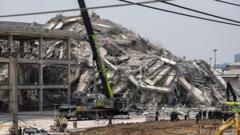Four hours ago, it was reported by local news sources that a Thai court has issued 17 arrest warrants concerning individuals connected to the construction of a skyscraper that was destroyed during an earthquake in March. The 30-storey structure, intended to house the State Audit Office, succumbed to seismic activity from a 7.7 magnitude earthquake that originated in neighboring Myanmar. Authorities have confirmed the recovery of 89 bodies from the wreckage, while seven individuals remain unaccounted for.
Investigators probing the building's collapse stated that the warrants target those involved in its design and oversight, as reported by local media outlets. Notably, businessman Premchai Karnasuta, a former president of Italian-Thai Development PLC., one of the nation's largest construction companies, was identified among the individuals facing allegations. Recent reports indicate that investigators discovered structural deficiencies in a lift shaft situated within the building. However, conclusive results from the Thai authorities regarding the precise cause of the collapse have yet to be disclosed.
Videos captured during the quake revealed high-rise buildings in Bangkok swaying and water cascading from rooftop pools onto streets below due to the tremors. While the majority of buildings in Bangkok emerged without significant damage, the State Audit Office tower—constructed from blue glass and steel and positioned near the popular Chatuchak market—was left in ruins after three years of construction work at a cost exceeding two billion Thai baht (approximately $59 million). Over 400 workers were present at the site when the structure fell, necessitating the deployment of rescue teams equipped with drones, sniffer dogs, cranes, and excavators.
The earthquake in Myanmar that struck on March 28 resulted in the loss of more than 3,000 lives and left over 4,500 injured, with tremors felt across several regions, including Thailand and southwest China.
Investigators probing the building's collapse stated that the warrants target those involved in its design and oversight, as reported by local media outlets. Notably, businessman Premchai Karnasuta, a former president of Italian-Thai Development PLC., one of the nation's largest construction companies, was identified among the individuals facing allegations. Recent reports indicate that investigators discovered structural deficiencies in a lift shaft situated within the building. However, conclusive results from the Thai authorities regarding the precise cause of the collapse have yet to be disclosed.
Videos captured during the quake revealed high-rise buildings in Bangkok swaying and water cascading from rooftop pools onto streets below due to the tremors. While the majority of buildings in Bangkok emerged without significant damage, the State Audit Office tower—constructed from blue glass and steel and positioned near the popular Chatuchak market—was left in ruins after three years of construction work at a cost exceeding two billion Thai baht (approximately $59 million). Over 400 workers were present at the site when the structure fell, necessitating the deployment of rescue teams equipped with drones, sniffer dogs, cranes, and excavators.
The earthquake in Myanmar that struck on March 28 resulted in the loss of more than 3,000 lives and left over 4,500 injured, with tremors felt across several regions, including Thailand and southwest China.




















